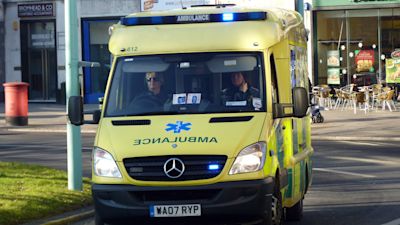South West ambulance service losing 750 hours a day to 'intolerable' delays

A new report has shown the stark pressures which are having an 'intolerable' impact on ambulance services in the South West.
South Western Ambulance Service NHS Foundation Trust (SWASFT) has revealed it is now losing 750 hours a day in handing over patients, compared to 400 hours a week two years ago.
The trust has provided the performance report for Cornwall Council’s health and adult social care overview and scrutiny committee.
The biggest impact on the trust’s performance has been due to delays in handovers at hospitals, which the trust says is higher than ever before.
It explains: “We are currently losing around 750 hours per day to handover delays at hospital emergency departments, compared to around 400 hours per week two years ago. This results in many ambulances queuing outside hospitals, and unable to respond to other emergency calls.
“On Friday 5 November the Trust lost 709 hours (or the equivalent of 64.4 double crewed ambulance shifts) to handover delays, 162 of which were lost at Royal Cornwall Hospital.
“During w/c 6 September 2021 the Trust lost over 5,609 hours to handover delays in excess of the 15 minute target. That is the equivalent of 510 ambulance shifts being lost (an average of 73 shifts lost per day).
'These levels have become intolerable'
“These levels have become intolerable and it’s an absolute priority for us and for our NHS partners to reduce these delays, so crews can get back out on the road for other patients.”
The trust says it is working with colleagues at Royal Cornwall Hospital to co-ordinate the handover of patients to improve the situation and ensure continuity of care.
When explaining the increase in demand for ambulance services the report states: “Weekly incidents ran at over 20,000 incidents for 25 consecutive weeks from the start of May, compared to levels prior to COVID-19 which were around 18,000 incidents per week.
“To put this in perspective, during the previous two years (2019/2020) the trust has only reported two weeks above 20,000 incidents, both of which fell over the Christmas and New Year period in 2019 when activity is traditionally busier.”
The report also explains that ambulance incident numbers also increased significantly higher than historic levels in September.
It states: “During September we experienced five consecutive days where daily incident numbers exceeded 3,000 or approximately a new incident every 25 seconds. To put this into context only 19 individual days in the history of the Trust have exceeded 3,000 incidents and only six of those days were outside the busy Christmas and New Year period.”
The report says the “unprecedented and sustained demand” led to the trust declaring a major incident on September 7 which then continued until September 10.
It adds: “Moving to a major incident is a decision the Trust does not take lightly but allows us to better manage and tackle the high levels of demand we are currently facing and implement a number of measures around resourcing, call handling, triaging patients, and meal breaks.”
Cornwall Council’s health and adult social care overview and scrutiny committee will consider the report when it meets next Wednesday (Nov 17).
Words by Richard Whitehouse for the LDRS Service